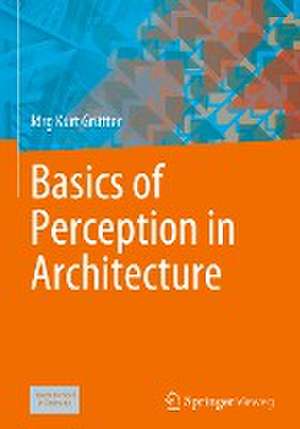Basics of Perception in Architecture
Autor Jörg Kurt Grütteren Limba Engleză Hardback – 15 oct 2020
Why is there so much debate about the appearance of our built environment, about the aesthetics of architecture today? Why do opinions about the aesthetic quality of buildings often diverge extremely even among experts? Why can’t we agree on architecture, on what is beautiful and what is not?
Most areas of construction, such as statics and building physics, are measurable and can therefore be substantiated with objective arguments. Yet this does not apply to the unquantifiable aesthetics of architecture. Accordingly, judgments on aesthetics are always subject-specific, and strongly dependent on the viewer.
Nevertheless, the aesthetics of architecture is not just a matter of taste. Many relationships between buildings as objects and viewers as subjects can be determined objectively with the help of perceptual psychology and information theory, as this book demonstrates.
| Toate formatele și edițiile | Preț | Express |
|---|---|---|
| Paperback (1) | 462.25 lei 6-8 săpt. | |
| Springer Fachmedien Wiesbaden – 16 oct 2021 | 462.25 lei 6-8 săpt. | |
| Hardback (1) | 498.93 lei 38-44 zile | |
| Springer Fachmedien Wiesbaden – 15 oct 2020 | 498.93 lei 38-44 zile |
Preț: 498.93 lei
Nou
Puncte Express: 748
Preț estimativ în valută:
95.47€ • 99.93$ • 79.46£
95.47€ • 99.93$ • 79.46£
Carte tipărită la comandă
Livrare economică 27 martie-02 aprilie
Preluare comenzi: 021 569.72.76
Specificații
ISBN-13: 9783658311551
ISBN-10: 365831155X
Pagini: 366
Ilustrații: X, 366 p. 309 illus., 226 illus. in color.
Dimensiuni: 168 x 240 mm
Greutate: 0.95 kg
Ediția:1st ed. 2020
Editura: Springer Fachmedien Wiesbaden
Colecția Springer Vieweg
Locul publicării:Wiesbaden, Germany
ISBN-10: 365831155X
Pagini: 366
Ilustrații: X, 366 p. 309 illus., 226 illus. in color.
Dimensiuni: 168 x 240 mm
Greutate: 0.95 kg
Ediția:1st ed. 2020
Editura: Springer Fachmedien Wiesbaden
Colecția Springer Vieweg
Locul publicării:Wiesbaden, Germany
Cuprins
Foundations of perception.- Part and whole.- Culture and style.- Site and surroundings.- Space.- Form.- Harmony.- Aesthetics and beauty.- Movement and path.- Light and colour.- Signs.
Notă biografică
Jörg Kurt Grütter studied architecture at the ETH (Swiss Federal Institute of Technology) in Zurich and at Kyoto University in Japan. He has been a Professor of Architecture Theory at the University of Applied Sciences in Bern, and a Visiting Professor at the European branch of the SCI-Arc (Southern California Institute of Architecture) in Vico Morcote, at the Art University in Isfahan, Iran, and at Namibia University of Science and Technology in Windhoek.
Textul de pe ultima copertă
This book makes the extremely complex process of architectural perception far more transparent and thus contributes to a better understanding of our built environment.
Why is there so much debate about the appearance of our built environment, about the aesthetics of architecture today? Why do opinions about the aesthetic quality of buildings often diverge extremely even among experts? Why can’t we agree on architecture, on what is beautiful and what is not?
Most areas of construction, such as statics and building physics, are measurable and can therefore be substantiated with objective arguments. Yet this does not apply to the unquantifiable aesthetics of architecture. Accordingly, judgments on aesthetics are always subject-specific, and strongly dependent on the viewer.
Nevertheless, the aesthetics of architecture is not just a matter of taste. Many relationships between buildings as objects and viewers as subjects can be determined objectively with the help of perceptual psychology and information theory, as this book demonstrates.The content
- Foundations of perception
- Part and whole
- Culture and style
- Site and surroundings - Space
- Form
- Harmony
- Aesthetics and beauty
- Movement and path
- Light and colour
- Signs
The target groupArchitects and architecture students, interested in architecture
The author
Jörg Kurt Grütter studied architecture at the ETH (Swiss Federal Institute of Technology) in Zurich and at Kyoto University in Japan. He has been a Professor of Architecture Theory at the University of Applied Sciences in Bern, and a Visiting Professor at the European branch of the SCI-Arc (Southern California Institute of Architecture) in Vico Morcote, at the Art University in Isfahan, Iran, and at Namibia University of Science and Technology in Windhoek.
Why is there so much debate about the appearance of our built environment, about the aesthetics of architecture today? Why do opinions about the aesthetic quality of buildings often diverge extremely even among experts? Why can’t we agree on architecture, on what is beautiful and what is not?
Most areas of construction, such as statics and building physics, are measurable and can therefore be substantiated with objective arguments. Yet this does not apply to the unquantifiable aesthetics of architecture. Accordingly, judgments on aesthetics are always subject-specific, and strongly dependent on the viewer.
Nevertheless, the aesthetics of architecture is not just a matter of taste. Many relationships between buildings as objects and viewers as subjects can be determined objectively with the help of perceptual psychology and information theory, as this book demonstrates.The content
- Foundations of perception
- Part and whole
- Culture and style
- Site and surroundings - Space
- Form
- Harmony
- Aesthetics and beauty
- Movement and path
- Light and colour
- Signs
The target groupArchitects and architecture students, interested in architecture
The author
Jörg Kurt Grütter studied architecture at the ETH (Swiss Federal Institute of Technology) in Zurich and at Kyoto University in Japan. He has been a Professor of Architecture Theory at the University of Applied Sciences in Bern, and a Visiting Professor at the European branch of the SCI-Arc (Southern California Institute of Architecture) in Vico Morcote, at the Art University in Isfahan, Iran, and at Namibia University of Science and Technology in Windhoek.
Caracteristici
Presents a transparent explanation of the extremely complex process of architecture perception Offers readers a better understanding of architectural aesthetics Facilitates the appreciation of our built environment
